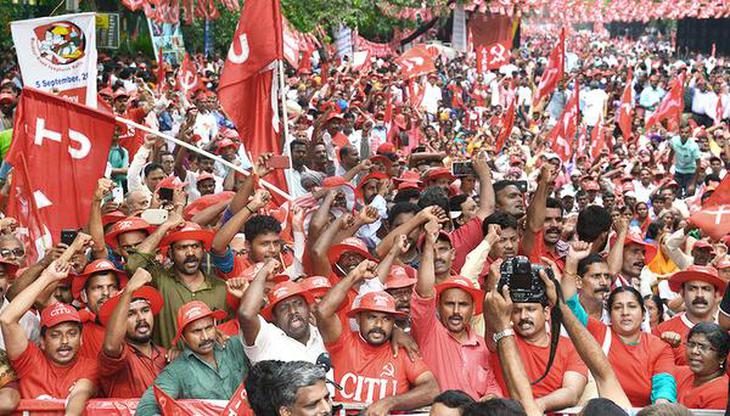Farmers, workers paint Delhi red
 Thousands take out rally for loan waivers, higher minimum support prices
Thousands take out rally for loan waivers, higher minimum support prices
Thousands of workers, farmers and agricultural workers participating in an anti-government Mazdoor Kisan Sangharsh rally turned central Delhi into a sea of red flags on Wednesday.
Their leaders and political backers in the Left were already looking ahead to wider protests in the next few months, in the run-up to the 2019 Lok Sabha elections
Cries of Modi Hatao and Inquilab Zindabad rent the air as columns of protesters marched through the 3-km stretch from Ramlila Maidan to Parliament Street for the rally organised by CPI(M)-affiliated unions.
This is the largest protest held at Parliament Street this year, according to a senior official of the Delhi police present at the venue. Organisers of the rally claimed that at least 1.5 lakh people had participated. Major demands included loan waivers for small farmers and higher minimum support prices for crops; a minimum wage of ₹18,000 a month and an end to anti-worker labour reform, and social and food security for all.
“The BJP has fooled the people for the last four years. They have not done anything for farmers,” said All India Kisan Sabha general secretary Hannan Mollah, accusing the Central government of not keeping its promises on a comprehensive minimum support price.
“This year, rural agricultural workers got only 27 days of work through MGNREGA,” said S. Thirunavukkarasu, president of the All India Agricultural Workers Union. “What has happened to ‘acche din’ promised by the Modi government? It was only acche din for corporates, for Adani and Ambani, Nirav Modi and Vijay Mallya. It was not for people like us.”
“This is a historic union between workers and farmers…Only if different sections of society come together, we can bring change,” said Tapan Sen, general secretary of the Centre of Indian Trade Unions (CITU), adding that the process of struggle was essential to make people understand who is their common enemy and vote against them in in the coming elections.
A slew of protests are planned for the next few months, several organised by an alliance wider than the CPI(M)’s unions.
“From November 28 to 30, we will hold a ‘Long March of the Dispossessed’. It will not just be farmers, but also the landless, Adivasis, Dalits and workers,” AIKS joint secretary Vijoo Krishnan said.
An umbrella organisation of more than 200 farmers groups, the All India Kisan Sangharsh Coordination Committee is expected to play a major role in the planned November rally, which will call for a special session of Parliament to pass two Bills related to MSP and loan waivers.
Leftist youth federations have planned a rally protesting unemployment on November 3, while all central trade unions (with the exception of one affiliated to the RSS-BJP) are negotiating the details of a two-day nationwide strike to be held before the end of the year, said Mr. Sen of CITU.
Separately, on Wednesday, the Bhartiya Kisan Union, a group led by Uttar Pradesh farm leader Rakesh Tikait, also announced its own Kisan Kranti Padayatra from Haridwar to Delhi from September 23 to October 2. “The farming community that voted the Bharatiya Janata Party to power feels cheated…government is not serious about their problems,” said Mr. Tikait.
For the workers and farmers at Wednesday’s rally, many of whom travelled thousands of kilometres by trains, buses, bikes and autos to reach Delhi, there is a recognition that one protest may not change anything in their daily lives.
Sameena is a mid-day meal worker and mother of five from Mewat, Haryana, who left home at dawn to come for the rally. She has brought along her youngest, nine-month old Nuksaan. “We get paid just ₹ 2,500 per month for a full day job. How can I feed my children on that?” she asks. She thinks ₹8,000 would be a fair amount, even though the rally organisers are demanding ₹18,000 as a minimum wage for all.
“We have demanded higher wages before, but nothing has changed. We will keep protesting until they change,” says her fellow worker Kerunissa.
T. Sagar of Nalgonda district in Telangana has brought along a bag of oranges from his own 20-acre orchard. “It sells for just ₹ 6/kg at our mandi at home. In Hyderabad or here in Delhi, people buy them for not less than ₹ 60 a kg, while I make a loss of ₹ 40,000 per acre,” he says, demanding that the government set a minimum price for fruits and vegetables as well as foodgrains.
For Jidhabai Prakash Ganguli, an Adivasi daily wager from Nashik in Maharashtra, even one acre of land would be sufficient. “Modiji promised to give us land, but he has done nothing. I will not forget,” she says.
Source: https://www.thehindu.com/news/national/farmers-workers-paint-delhi-red/article24875033.ece

